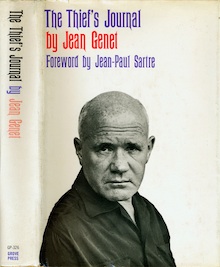The Thief's Journal
This article has multiple issues. Please help improve it or discuss these issues on the talk page. (Learn how and when to remove these template messages)
|
 | |
| Author | Jean Genet |
|---|---|
| Original title | Journal du voleur |
| Translator | Bernard Frechtman |
| Country | France |
| Language | French |
| Genre | Novel |
| Publisher | Gallimard (Original French), Grove Press (English Translation) |
Publication date | 1949 |
Published in English | 1964 |
| Media type | |
The Thief's Journal (Journal du voleur) is perhaps Jean Genet's most famous work. It is a part-fact, part-fiction autobiography that charts the author's progress through Europe in a curiously depoliticized 1930s, wearing nothing but rags and enduring hunger, contempt, fatigue and vice. Spain, Italy, Austria, Czechoslovakia, Poland, Nazi Germany, Belgium... everywhere is the same: bars, dives, flop-houses; robbery, prison and expulsion.
The novel is structured around a series of homosexual love affairs and male prostitution between the author/anti-hero and various criminals, con artists, pimps, and even a detective.
A common theme is the inversion of ideals: betrayal is the ultimate form of devotion, petty delinquency is brazen heroism, and confinement is freedom.
Under the inspiration of "Being and Nothingness", this work is affirmed to be the "pursuit of the impossible nothingness" and it was dedicated to Jean-Paul Sartre and "Castor", i.e. Simone de Beauvoir. Sartre wrote his essay "Saint Genet", influenced by this work, in 1952.
Genet appropriates Christian language and concepts to pursue an alternative form of "sainthood" with its own trinity of "virtues" - homosexuality, theft, and betrayal. Each burglary is set up as quasi-religious ritual, and the narrator describes his self-preparation for his crimes like that of a monk in a vigil of prayer, readying himself for a "holy" life. He establishes a "constructed reader," a fictional personification of the bourgeois values of the late 1940s, against which to measure his deviance from the "norms" of society.
The novel is a voyage of self-discovery, transcending moral laws; it is the philosophical expression of perverted vice; the working out of an aesthetic of degradation.
